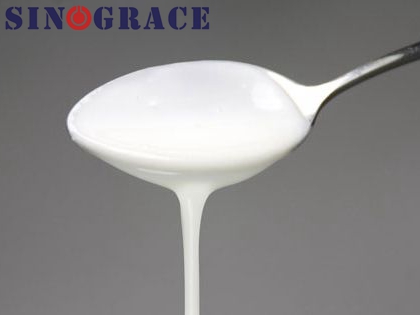Types and Advantages and Disadvantages of Thickeners in Waterborne Coatings
The dosage of paint additives in the paint is little, but can significantly improve the performance of paint and it has become an indispensable part. Thickener is a rheological additive that not only thickens the coating, prevents sagging in construction, but also gives excellent mechanical properties and storage stability. For the lower viscosity of the water-based paint, it is a very important class of additives.
Type of waterborne coating thickener
A lot of thickener varieties are available on the market currently, mainly inorganic thickeners, cellulose, polyacrylate and associative polyurethane thickener four categories. Inorganic thickener is a kind of gel mineral that can forming thixotropy by water swelling. Mainly including bentonite, attapulgite, aluminum silicate, etc., of which the most commonly used bentonite. Cellulosic thickeners use a long history, many varieties, with methyl cellulose, carboxymethyl cellulose, hydroxyethyl cellulose, hydroxypropyl methyl cellulose, was the main stream of thickeners, One of the most commonly used is hydroxyethyl cellulose. Polyacrylate thickeners can be divided into two types: one is water-soluble polyacrylic acid salt; the other is acrylic acid, methacrylic acid homopolymer or copolymer emulsion thickener, this thickener itself is acidic, with alkali or ammonia to pH8-9 in order to achieve thickening effect, also known as acrylic acid swelling thickener. Polyurethane thickener is a newly developed associative thickener in recent years.
The characteristics of various types of thickeners
Cellulosic thickeners
Cellulosic thickeners have high thickening efficiency, especially for the thickening of the aqueous phase; less restrictions on the coating formulation and wide application; the available pH range is large. But it is poor leveling, roller coating when the phenomenon of more splash, poor stability, vulnerable to microbial degradation and other shortcomings. Because of its low viscosity at high shear, high viscosity in static and low shear, so when the coating is completed, the viscosity increases rapidly, can prevent sagging, but on the other hand,it will caused poor leveling. Studies have shown that the relative molecular mass of the thickener increases and the spatter of the latex coating also increase. Cellulose thickeners are prone to splash due to their relatively high molecular weight. And because the cellulose is better hydrophilic, will reduce the paint film water resistance.
Polyacrylic acid thickener
Polyacrylic acid thickener has strong thickening and good leveling, good biological stability, but sensitive to pH, poor water resistance.
Associated polyurethane thickener
The association structure like polyurethane thickener will damage under the action of the shear force, the viscosity decreases. When the force loss, viscosity can be restored, to prevent the sagging phenomenon during construction process. And its viscosity recovery has a certain lag, is conducive to coating smooth. The relative molecular mass of the polyurethane thickener (thousands to tens of thousands) is much lower than the relative molecular mass (hundreds of thousands to several million) of the first two types of thickeners and does not contribute to splashing. Polyurethane thickener molecules also have hydrophilic and hydrophobic groups, hydrophobic groups and coating the substrate has a strong affinity, can enhance the water resistance of the coating.
As the latex particles involved in the association, it will not produce flocculation, which can make the coating smooth, with high gloss. Associated polyurethane thickeners have many properties over other thickeners, but due to their unique micellar thickening mechanism, the components of the coating formulation that affect micelles are bound to have an effect on thickening. With such thickeners, should take full account of the impact of various factors on the thickening performance, do not easily replace the paint used in the emulsion, defoamer, dispersant, film additives and so on.
Inorganic thickener
The inorganic thickener has the advantages of strong thickening property, good thixotropy, wide pH range and good stability. However, because bentonite is an inorganic powder, good absorbency, can significantly reduce the coating surface gloss, play a similar role in matting agent.
